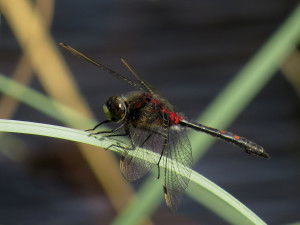Our new Policy Position Statements – Climate Change
23rd November 2015
As a freshwater charity, there are issues that we take a clear position on in order to inform our own policy and practice. To make our position on key issues transparent, we are beginning a new series of Policy Position statements that outline the issue, how it affects freshwater biodiversity, and what we’ll do about it. Our first two statements are on the very topical issues of Climate Change and Fracking.
Climate change and freshwater

In the UK, habitat loss and pollution are still the main threats degrading freshwater biodiversity. Climate change is the new kid on the block, but is rapidly emerging as a major concern. Global warming effects are already here: causing local extinctions in UK streams and the disappearance of pond species from southern Britain. It’s not all bad news of course – both the north and south of England are seeing new dragonflies arrive, for example. But overall, as climate change ramps up – and warming of 2°C is likely even by the 2030s –it’s effect on freshwater biodiversity will undoubtedly be increasingly negative.

One of the main concerns is the effect of sea level rise on our coastal freshwater wetlands. Ditch systems in areas like the Somerset Levels and Humberhead Levels are the last remnants of huge floodplains once dominated by many slow flowing channels and pools. Although now drained, the remnant ditches are amongst the richest freshwater habitats in the UK. Coastal lowlands like the Norfolk Broads are already showing rising sea level impacts with the number of saline intrusions along Broadland rivers and ditches increasing significantly the since the 1970s. Natural England suggest that catastrophic events where storm surges overtop the Broad’s sea defences may now be inevitable – permanently damaging the internationally important fens, lakes, grazing marsh ditches and wet woodlands here.
Away from the coasts the future impacts of climate are expected to be just as considerable.
Aquatic invertebrates and fish are very sensitive to heat stress, including the lower dissolved oxygen of warmer waters. With ever higher temperatures, changes in hydrology, water chemistry and pollution from winter flooding, summer droughts and extreme weather events will impact all freshwaters and their wildlife. Human pressures from changing land-use and greater demands for water will add further stress, and the speed of climate change means that it will be hard for many species to adapt. Local, regional and even national extinctions are likely to be inevitable, and many waterbodies and wetlands will be increasingly impoverished.
So what can be done? The science is pretty clear – to protect the greatest number of plants and animals we need to follow the Lawton Review principles of ‘more, bigger, better and joined’: enhancing and extending our highest quality areas of semi-natural land, and linking them to create networks that enable wildlife to adapt and move.
Want to know more?
- Take a look at our new Policy Position page.
- Read about our thoughts on fracking, a threat to freshwaters with a strong connection to climate change.
